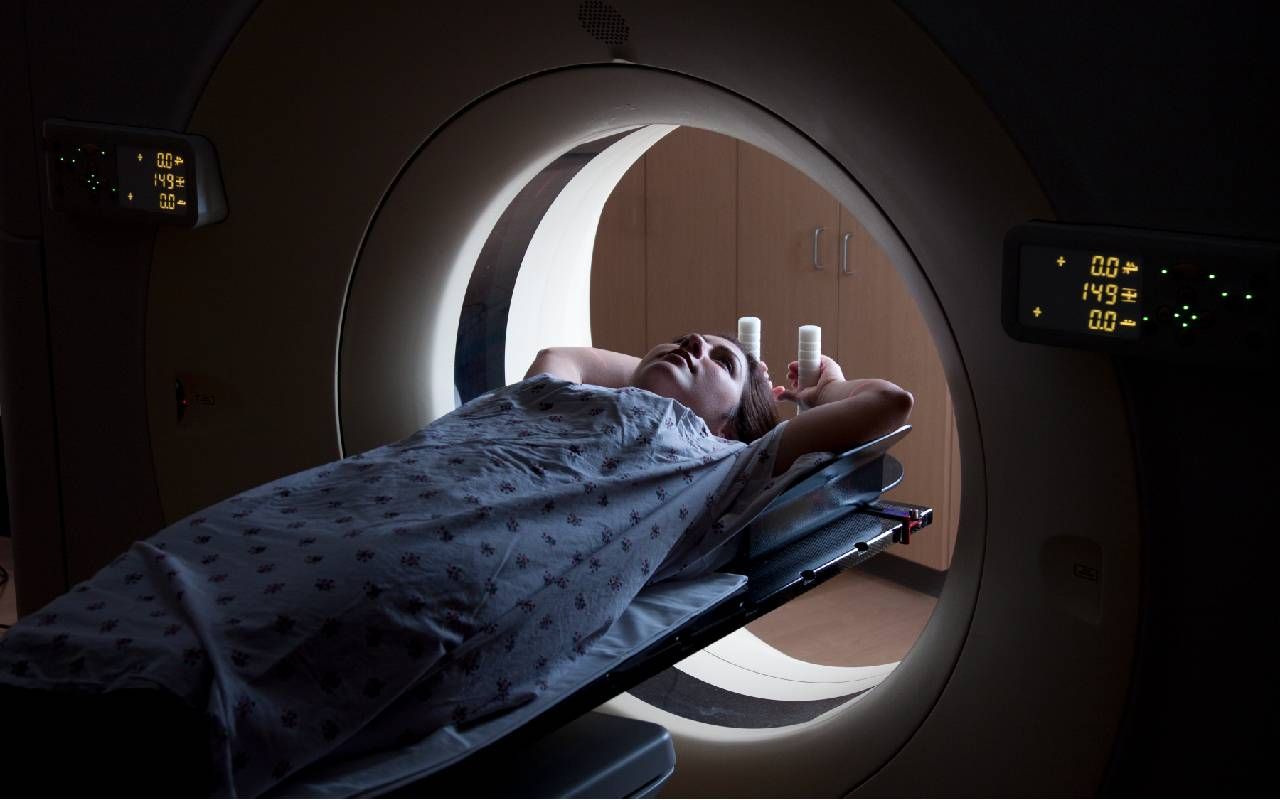Understanding Scanxiety
Scanxiety is the apprehension felt before a scan or medical test, usually to determine if there has been cancer return, growth or, hopefully, regression
Maureen Salloum of Littleneck, New York — wife, mother, grandma, ballet aficionado, dragon boat team participant, book lover — is an ovarian cancer survivor. While it's been, at different times, a frightening, uncomfortable and even debilitating experience, it hasn't stopped her from living her life.

Since her diagnosis thirteen years ago, she has attended her children's college graduations, danced at her daughter's wedding, and eaten porchetta and Pasta Amatriciana in Italy. A former counselor at a school for the deaf, Salloum, now retired, spends several days a week taking care of her lively two-year-old granddaughter who fills her heart with almost unspeakable joy. She and her husband Sam, a contractor, go on vacation or fly off to visit relatives in other parts of the country as often as possible.
"None of us are promised a tomorrow, and I know that cancer will be a part of my life for as long as I live. I'm eager to make memories and squeeze in as much happiness as I can," she says.
Dreading the Patient Portal
Although she's had several recurrences in the years since her original diagnosis (none since 2018, she reports happily) she has survived surgery and chemotherapy and radiation and has overall done quite well. And yet, when it's time for one of the many follow-up scans or blood draws that will tell the doctors if her cancer is still in remission, she has a bad — a really bad — day or two both before the tests and while waiting for the results. She has trouble sleeping and spends the time fighting off waves of anxiety.
"While I'm incredibly grateful to have beaten the odds, I'm always waiting for the other shoe to drop."
She says, "I dread looking at the patient portal when I know the latest numbers are posted. Sometimes I just refuse to open it and wait four or five days until I get to see my doctor. I know that life can change in a heartbeat, and with the frequency of tests that I have to undergo, I live in a constant level of stress."
She continues, "While I'm incredibly grateful to have beaten the odds, I'm always waiting for the other shoe to drop. Now that I know how good life can be without big, bad chemotherapy, the threat of having to go through that again is terrifying."
What is Scanxiety?
Scanxiety. It's a cute name for a distinctly un-cute feeling, the apprehension, uneasiness and physical sensations felt before an upcoming scan or medical test, usually to determine if there has been cancer return, growth or, hopefully, regression. Frequency of scanning has increased in the era of personalized medicine, partially due to the proliferation of clinical trials which are available.
Scanxiety been recognized as a frequent, typical part of the cancer survivorship experience by the American Cancer Society and other organizations. A 2021 article in Cancer Medicine says that this under-reported but widely-present issue and its connection with recurrence or progression of disease "continues to hang over patients and their families for the rest of their life like the sword of Damocles."
"Scanxiety is rational because the results of each scan can, literally, be a matter of life or death."
The article goes on to say that the issue should not be viewed as an anxiety disorder but rather is related to the concept of fear of cancer recurrence/progression (FCR), a normal phenomenon for cancer patients which brings the issue of mortality front and center.
Psychiatrist James Randolph Hillard, MD, in an article published in the ASCO Connection, a professional networking site for the worldwide oncology community, has written that "Scanxiety is rational because the results of each scan can, literally, be a matter of life or death."
The anxiety often gets worse after the test has been completed but before the results are in. Memories of having received the original bad news come rushing back, and the anxiety is experienced not only by the patient but by family and friends. Bad news? Good news? The wait can be agonizing.
"You want cancer to be in the rearview mirror, and the fear of recurrence brings back the trauma and the drama."
"While scanxiety is still a very real thing, the way we monitor cancer is changing, and we know that biomarkers in the blood can reveal important information, so waiting for results of blood tests has added another source of anxiety," says Catherine Alfano, a clinical psychologist, Vice President of Cancer Care Management and Research at Northwell Health Cancer Institute and a Professor in the Department of Medicine at the Donald and Barbara Zucker School of Medicine at Hofstra/Northwell in Hempstead, New York.
Cancer biomarkers — biological molecules found in your blood, other bodily fluids or tissues – can distinguish benign from malignant findings and, for people already diagnosed with cancer, can detect recurrence or response to therapy.
Frequent Testing as Part of Life
For many survivors, particularly those with metastatic disease, cancer is a chronic disease which necessitates frequent surveillance testing, explains Alfano. With maintenance medications, even with active cancer, people can do well, but the fear that the treatment will stop working is always there. "You want cancer to be in the rearview mirror, and the fear of recurrence brings back the trauma and the drama," she says.
Alfano points out that there is an optimal level of anxiety for cancer survivors. A little bit of anxiety can be helpful because it's activating and gets you to follow-up with your health care providers, eat well and go for monitoring as recommended.
Even if you are handling the stressors well, there will be moments when you are bombarded with emotions and it feels like the floodgates are opening. This is normal and, as one survivor said, "If you fasten your seat belt, hang on and breathe your way through it, the ride will be over that much sooner."
Too much anxiety, however, can become paralyzing and seriously affect day to day life.
According to Alfano, people have different coping styles when dealing with health challenges and with changes in health status.
Monitors are people who want to know everything about their disease. They read about it, scour the Internet, ask many questions and want to be informed about any changes in their treatment and prognosis. They often want to identify a plan as to how things will proceed and feel better when they can be an active participant in decisions.
A little bit of anxiety can be helpful because it's activating and gets you to follow-up with your health care providers
Blunters are people who feel, "I don't want to think about my illness." They try to distract themselves, are not interested in reading about their disease or treatment, and don't talk much about their cancer to other people. They may not want to join a support group because it is a reminder to them that they do in fact have an illness.
Alfano says that either approach is fine, as long as you are compliant with treatment and follow-up and do what you need to do to take care of your health. Blunting becomes problematic only when you ignore recommendations because you literally don't want to deal with things.
Managing Anxiety Around Testing
According to the National Cancer Institute, persons with cancer experience different levels of distress. They can range from normal feelings of sadness and vulnerability to emotions that affect quality of life such as panic, sadness and spiritual crisis. A severe anxiety disorder or clinical depression can be more incapacitating and you should speak with your health care team to determine if some intervention might be needed.
Ways to cope with anxiety around cancer testing results include:
- Seeking support from family, friends, coworkers, helping professionals, online forums and survivor support groups.
- Understanding that much of the anxiety you’re experiencing is normal. Having a serious illness is very stressful. Be kind and gentle to yourself in accepting that your feelings are valid and real.
- Utilizing relaxation techniques — mindfulness, meditation, yoga, breathing exercises, positive affirmations, guided imagery — to help prevent as well as relieve anxiety.
- Movement and exercise, when your body can handle it, is an excellent antidote to anxiety. Even just a short walk and a change of scenery can be effective.
- Alfano suggests a dedicated short period of time every day in which you give yourself permission to worry. When negative thoughts pop up at other times, remind yourself that “It’s not worry time yet” and distract yourself with something pleasurable, absorbing or productive. Playing games on your phone is fine, too!
- Counseling or psychotherapy can be a helpful adjunct to treatment. Cognitive-behavioral therapy (CBT) and Acceptance and Commitment Therapy (ACT) have been found to be particularly beneficial in addressing the anxiety of the re-entry phase when you transition from identifying as a cancer patient to becoming a post-treatment survivor.


